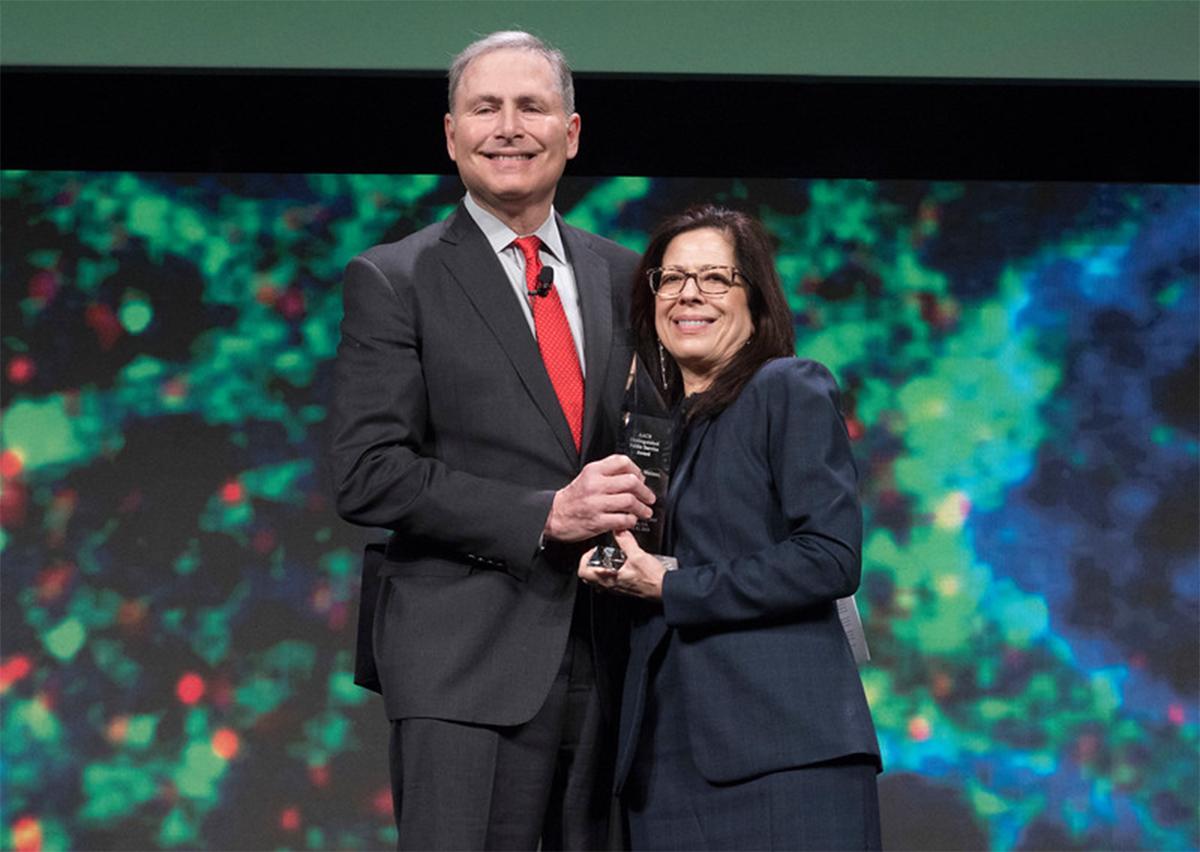Georgetown Lombardi Director Louis Weiner Receives AACR 2019 Distinguished Public Service Award

Posted in News Release | Tagged gastrointestinal cancer
Media Contact:
Karen Teber
km463@georgetown.edu
ATLANTA (March 31, 2019) — The American Association for Cancer Research (AACR), the oldest and largest scientific organization in the world, today honored Georgetown Lombardi Comprehensive Cancer Center director Louis M. Weiner, MD, with a 2019 AACR Distinguished Public Service Award.
The award recognizes groundbreaking, innovative work throughout the cancer community.
During the AACR Annual Meeting 2019 opening ceremony in Atlanta, AACR President Elizabeth Jaffee, MD, described Weiner as a “luminary in the field of cancer immunology.”
“Dr. Weiner has dedicated his research career to developing and optimizing monoclonal antibody-based immunotherapies,” she said. “His current work focuses on deepening his understanding of why tumors become resistant to these and other immunotherapies with the goal of developing new treatments to overcome resistance.”
Weiner, a gastrointestinal medical oncologist and immunology researcher, established the AACR Cancer Immunology Task Force and AACR Cancer Immunology Working Group.
“Your efforts to establish cancer immunology as a key scientific priority for the AACR have been significantly ahead of the curve and stand as a testament to your expertise and unparalleled insight into the future trajectory of cancer research,” said AACR CEO Margaret Foti, PhD, in announcing his award.
“Thank you for this wonderful, wonderful recognition,” Weiner said to the thousands of cancer researchers gathered for the opening ceremony.
“Every cancer that threatens the life of a person has somehow evaded immune recognition and destruction. Understanding how that happens and identifying vulnerabilities that can be therapeutically targeted is the goal of cancer immunology,” Weiner said. “As recently as 20 years ago, the scientific and clinical cancer communities were skeptical of the value of a future in cancer immunology.”
Weiner concluded his remarks by recognizing the 2018 Nobel Prize recipients in medicine or physiology for their work in immunology.
“On behalf of my colleagues who have brought this transformative research to life and into the clinic, and with great appreciation for the pioneering work of people like Jim Allison and [Tasuku] Honjo, I thank the AACR for this award,” Weiner said. “I am honored and humbled.”
Weiner holds the Francis L. and Charlotte G. Gragnani Chair and is professor of oncology and chair of the Department of Oncology at Georgetown University Medical Center.
He also serves as the director of the MedStar Georgetown Cancer Institute, a cancer service line serving patients in the Washington, D.C., and Baltimore metropolitan areas.
Weiner is recognized for his laboratory and clinical research focusing on new therapeutic approaches that mobilize the patient’s immune system to fight cancer using monoclonal antibodies and other modalities of therapy. His current research focuses on identifying and therapeutically exploiting mechanisms employed by malignant cells to combat immune destruction.
Prior to joining Georgetown Lombardi as director in 2008, Weiner served as chairman of the medical oncology department and vice president for translational research at Fox Chase Cancer Center in Philadelphia, Pa., and also served as professor in the department of medicine at Temple University School of Medicine.
He is an active member of AACR and the American Society of Clinical Oncology. He has served as chair of the NCI Board of Scientific Counselors for Clinical Sciences and Epidemiology and as a member of the NCI Clinical Trials Advisory Committee. He also served on the NCI’s blue ribbon panel working group on immunotherapy for the National Cancer Moonshot Initiative and the Advisory Panel of the National Institutes of Health (NIH) Center for Scientific Research, which administers NIH research grants.
Weiner earned his bachelor’s degree in biology with honors from the University of Pennsylvania and his MD from Mount Sinai School of Medicine. After completing his internship, residency and service as chief medical resident at the University of Vermont’s Medical Center Hospital, he held clinical and research fellowships in hematology and oncology at Tufts University School of Medicine in Boston.
About Georgetown Lombardi Comprehensive Cancer Center
Georgetown Lombardi Comprehensive Cancer Center is designated by the National Cancer Institute as a comprehensive cancer center — the only cancer center of its kind in the Washington, D.C. area. A part of Georgetown University Medical Center and MedStar Georgetown University Hospital, Georgetown Lombardi seeks to improve the diagnosis, treatment, and prevention of cancer through innovative basic and clinical research, patient care, community education and outreach, and the training of cancer specialists of the future. Connect with Georgetown Lombardi on Facebook (Facebook.com/GeorgetownLombardi) and Twitter (@LombardiCancer).
About Georgetown University Medical Center
Georgetown University Medical Center (GUMC) is an internationally recognized academic health and science center with a four-part mission of research, teaching, service and patient care (through MedStar Health). GUMC’s mission is carried out with a strong emphasis on public service and a dedication to the Catholic, Jesuit principle of cura personalis — or “care of the whole person.” The Medical Center includes the School of Medicine and the School of Nursing & Health Studies, both nationally ranked; Georgetown Lombardi Comprehensive Cancer Center, designated as a comprehensive cancer center by the National Cancer Institute; and the Biomedical Graduate Research Organization, which accounts for the majority of externally funded research at GUMC including a Clinical and Translational Science Award from the National Institutes of Health. Connect with GUMC on Facebook (Facebook.com/GUMCUpdate) and Twitter (@gumedcenter).
